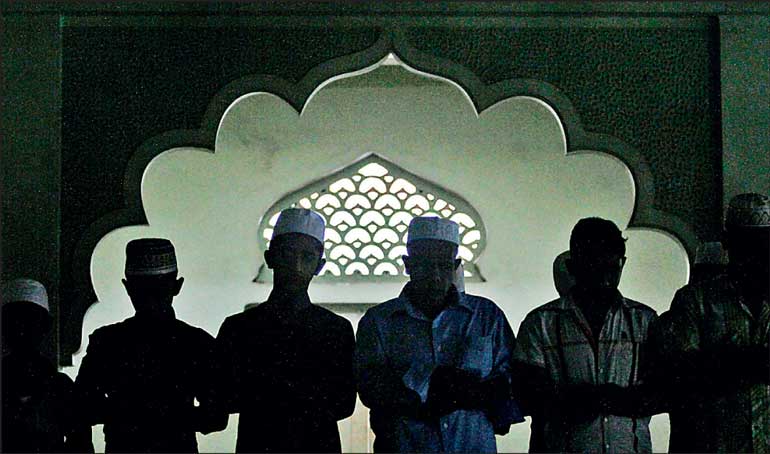Friday Feb 13, 2026
Friday Feb 13, 2026
Saturday, 12 February 2022 00:00 - - {{hitsCtrl.values.hits}}

 President Gotabaya Rajapaksa through a Gazette (extraordinary) notification No. 2251/30 dated 26-10-2021 and No. 2252/56 dated 06/11/2021 established a ‘Presidential Task Force for One Country, One Law (OCOL)’, by virtue of the powers vested in the President by Article 33 of the Constitution of Sri Lanka. The 13-member One Country One Law task force is headed by Galagoda Aththe Gnanasara Thero.
President Gotabaya Rajapaksa through a Gazette (extraordinary) notification No. 2251/30 dated 26-10-2021 and No. 2252/56 dated 06/11/2021 established a ‘Presidential Task Force for One Country, One Law (OCOL)’, by virtue of the powers vested in the President by Article 33 of the Constitution of Sri Lanka. The 13-member One Country One Law task force is headed by Galagoda Aththe Gnanasara Thero.
The President’s Senior Assistant Secretary Jeevanthie Senanayake was appointed as the Secretary to the Presidential Task Force. The ‘Presidential Task Force for One Country, One Law’, is tasked with the study of the implementation of the concept; ‘OCOL’ within Sri Lanka and prepare a draft Act for the said purpose.
Lead Muslim civil society organisations and religious leadership wrote to the President expressing their deep concern and lack of confidence in the impartiality and competence of the Chairman of the Task Force to examine the issues involved and drafting relevant laws.
The findings of The Presidential Commission of Inquiry to investigate and inquire into and report or take necessary action on the bomb attacks on 21 April 2019 clearly indicate, that his speeches “contained without any doubt, hate speech” and further was of the view that part of the speeches made, can form the basis for a prosecution in terms of the International Covenant on Civil and Political Rights (ICCPR) Act No. 56 of 2007. Moreover, they went on to recommend that the Attorney General considers filing charges against him; in view of which, the Muslim community is unconvinced that the purpose of the One Country One Law Task Force can be achieved by such an individual chairing this task force.
Sri Lanka is a multi-cultural, multi-ethnic and multi-religious country. This diversity is reflected in its personal laws of minority groups and are protected under our Constitution. Whilst there is no question that there must be uniformity in the application of the general, civil and criminal law (Penal Code, Criminal Procedure Code, etc.), personal matters such as marriage, divorce, inheritance and succession, are matters that properly fall within the purview of personal laws. The Muslim community has enjoyed the benefits of these personal laws (whether codified or not) since time immemorial; from the time of the Sri Lankan Kings to date, more than 1,000 years in existence.
These personal laws have never infringed on the rights of other communities, whilst being protected by the Constitution of Democratic Socialist Republic of Sri Lanka. The culmination of a One Country One Law, which seeks to abolish personal laws (Thesawalamai, Kandyan, and Muslim) of all communities, will merely be a cause for contention amongst communities and not a cause of harmony. Undoubtedly, there is an urgent need for reform of these laws but not a need for it to be abolished.
The Muslim community vehemently opposes any attempt to abolish its personal laws in the guise of implementation of the “One Country One Law” concept, and are convinced that 98% of the Muslim community will stand in solidarity, in emphatically opposing the elimination of all personal laws, especially the Muslim Personal Laws of Sri Lanka.
Regretfully, some Muslims had been coaxed in to submitting proposals to the task force to abolish the Muslim Personal Laws (MPL). Some of them have complained of personal experiences of injustice, corruption and prejudice of certain Quazis, hence the Muslim Personal Laws should be repealed. MPL has been in existence since the Dutch period and was called the Mohammedan code that addresses the Muslim marriage, divorce, inheritance, etc. These laws have religious and cultural foundations that conform to the Islamic faith.
The betrayal by certain Muslims with vested interests caused a huge uproar amongst the Muslim community. Muslim activists started a signature campaign to protest the possible repeal of the Muslim Personal laws. So far over 50,000 protesting signatures have been delivered to the Presidential Task Force Secretariat from across the country and is expected to increase to at least 75,000 within the next few days. Many Muslims have called upon the Task Force not to repeal but reform the Muslim Personal Laws that respects gender equality and justice conforming to international standards while preserving Quranic injunctions.
There may be individuals who are corrupt in the quazi system, but the majority of them are honourable persons. They have acceptance by the community and are appointed by the Judicial Service Commission. As we all know, there have also been quite a few allegations against the judiciary and was a hotly debated subject with the recent imprisonment of Parliamentarian Ranjan Ramanayake. No one has called for repeal of the justice system because of various allegations. Corruption, nepotism and political bias has encompassed every level of Sri Lankan society. A few individuals not conforming to norms is no reason to repeal any law.
The Quazi system certainly needs reforms and the Muslim community has already submitted its proposals to the Minister of Justice that calls for the Quazi system to be upgraded, suitable persons recruited, appointment of female Quazi, a private place to conduct proceedings and various other constructive recommendations.
The Quazi system is a judicial body with personnel appointed by the Judicial Services Commission. Appeals lie with the Board of Quazis and then to the Supreme Court. The primary role of a Quazi is to mediate and reconcile marriages in conflict based on the Quran and Islamic jurisprudence.
This legal system is a complex mixture of laws. Dutch colonial administrators codified the rules of inheritance, marriage and divorce in order to facilitate the application of Muslim family law. This Code was adapted by the British in 1799. The British later enacted the Registration of Muslim Marriages Ordinance in 1896 repealing parts of the Dutch Code. The other important piece of legislation relating to Islamic family law is the Muslim Intestate Succession Ordinance of 1931 which is still in force. The 1896 Ordinance was later abolished and the Muslim Marriage and Divorce Act (MMDA) was enacted in 1951, which essentially reinforces the principle that, in matters of personal status, the rights and duties of the parties involved are to be determined by the religious school of laws to which the parties belong.
The Muslim community has been intimidated into silence since the fateful Easter Sunday bombing of 21/4/2019 due to the involvement of a few Muslims by name. This tragedy branded the 2.1 million Muslims as terrorists. The community did not recognise the bombers as Muslims and were not even given an Islamic funeral. Pushing the entire community to the wall by vested interests may have far reaching consequences leading to despair and radicalisation of Muslim youth. Many are losing faith in the Sri Lankan nation and are endeavouring to migrate.
Sri Lanka needs equitable justice through its judiciary while recognising the inalienable rights of minorities in a multi ethnic, multi religious, multicultural and multilingual communities that form the Sri Lankan nation. These vibrant colours form the Sri Lankan nation that should flourish.
(The writer is a social activist and Vice President of the Muslim Council of Sri Lanka.)